
The Prince of Garbage Men:
A Dance to the Meaning of Work
B. Kim Barnes
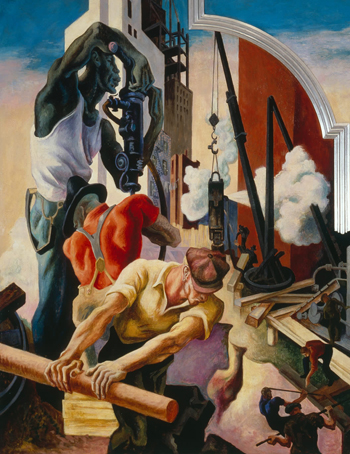
For most of us, Labor Day signifies the end of summer. Summer vacation is over, the kids are back to school, and the cycle of labor begins in earnest. As we’ve recently observed Labor Day, I want to share this inspiring image of labor and livelihood.
Many years ago, as I was leaving home for work very early on a misty morning, I saw far ahead of me on an otherwise empty street a man who was dancing. He was graceful, his long legs moving in an effortless, fluid adagio. Now an arabesque, now a pirouette, and then a grand jeté. As I got closer, I saw that he was carrying something. Back and forth he danced, bending and bowing, swinging his burden as if it weighed nothing. He moved, it seemed, for the sheer joy of it. It was magical.
The performance was not for me or any other sleep-deprived commuter. This was a man performing his work with dignity and grace and delight. My work, he communicated in his dance, is to make the world more clean and beautiful. I thought, as I passed him, of the story of the bricklayer who was not just laying bricks, but building a cathedral. Of the janitor at NASA who told President Kennedy that he was helping to put a man on the moon.
This is the prince of garbage men, I thought then. He was all the more memorable because he was alone, creating beauty and meaning from his work, practicing his craft with elegance and refinement.
The image of the dancing garbage collector has stayed with me for more than thirty years now. It has become a visual metaphor for the Buddhist concept of “right livelihood,” described as doing one’s work in a noble and transcendent way, whatever that work might be. May we all be so fortunate as to find in our livelihood a reason to dance.
This article is adapted and reprinted from Kim Barnes' LinkedIn page, October 2016
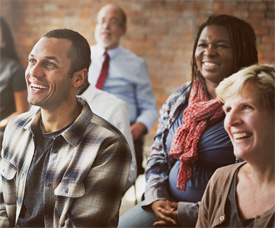
Being an Amazing Facilitator is Like Being a Successful Stand-Up Comic (excerpt)
Nelson Soken, Ph.D.
On a plane ride from Seattle returning from vacation, I saw a recently released movie entitled “Dying Laughing” where stand-up comics share insights into their lives. A description of the movie is: “The craft, creative process, and complicated lives of stand-up comedians.”
What struck me as I watched were the similarities between good facilitation and stand-up comedy; although being a comedian is significantly more difficult and painful from what I saw described in the movie. Here are some lessons I learned of which I plan to be mindful and to apply as I continue to grow as a facilitator:
- Embrace fear: Comedians talk about the fear they experience prior to getting on stage. Facilitators often experience similar feelings prior to every “performance” where they feel nervous, anxious, and maybe even physically ill. Our anxieties may be used as a reminder to always prepare, and above all else, anticipate the “rush” of jumping onto a new and unpredictable stage. If that thrill no longer exists, perhaps one should do some soul-searching as to whether their passion for the “game” has been lost.
- Lean into failure: Comedians share their most epic failures and how it has shaped their comedy act. Failure can be an amazing learning tool and keeps things fresh. It reminds all of us not to be complacent and to always be on our toes by prepping for all situations. Continually taking risks and trying out new material and techniques also keeps us fresh and allows us to up our “game”. As Winston Churchill said, “Success is stumbling from failure to failure with no loss of enthusiasm.”
- Get command of the room quickly: Comedians discuss the importance of capturing the audience right away and taking control of the room by asking questions and creating the sense that each audience member is special. Facilitators can apply these same tools/techniques by individually greeting each participant before the workshop, introducing yourself and your experiences on the topic, finding out something about each participant, using music and pictures prior to the workshop to set the tone, and using multimedia and ice breaker activities to establish the right atmosphere and establish rapport and credibility as a facilitator.
Read the entire article on the Barnes & Conti Website
Nelson Soken, Ph.D, in addition to being an outstanding facilitator, is Chief Innovation Strategist at Barnes & Conti
Did you like this article and/or find it useful? Follow us on social media (see links at the top) for much more!
Coming Soon: New Edition of Exercising Influence
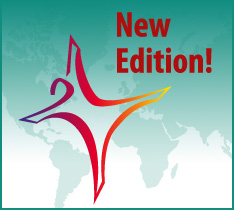 Exercising Influence is getting an update!
Exercising Influence has been our most popular program since its
introduction over 20 years ago. The program has become even more relevant
to formal and informal leaders in our complex, global organizations.
Exercising Influence is getting an update!
Exercising Influence has been our most popular program since its
introduction over 20 years ago. The program has become even more relevant
to formal and informal leaders in our complex, global organizations.
Although we update Exercising Influence regularly, we undertook a major revision this past summer. The program retains the models, general flow, and its near universal applicability—and we have done our best to streamline the participant and facilitator materials and prepare them to be converted, as needed, to other media (e.g. mobile devices, and more).
Significant changes include:
- The participant guide will be in a “magazine” style and will comply with ADA recommendations.
- Slides will be more engaging and available in both widescreen (16:9) and standard (4:3) aspects.
- Most supplementary materials will be downloadable, with planning forms that are fillable online.
We have also added some new exercises and revised others, informed by the latest research in brain science and behavioral economics. We will be providing additional tools and resources for facilitators, participants, and their managers.
Over the next few months, we will be enriching our existing app with activities and examples to encourage participants to continue their development after the session. The new classroom materials will be available before year-end. Many people have contributed to this project so far, managed with skill and patience by Nermin Soyalp. If you have any questions about the new materials, requests, and/or feedback, please share it with Nermin – we are still in the finalizing process, so now is a good time to let us know.
Use this link to contact Nermin about the new Exercising Influence
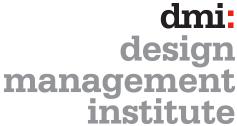 Exercising
Influence and Strategic Thinking at DMI Symposium
Exercising
Influence and Strategic Thinking at DMI Symposium
Barnes & Conti is pleased to be a part of dmi:Symposium Manhattan Beach, California, on December 7, 2017. The focus of this Symposium is “Design and Influence.” DMI, the Design Management Institute, is a global organization of emerging and senior leaders that connects, promotes, and elevates the role of Design Management and Design innovation in business, culture and society. The Symposium will address ways that design can have a greater impact on supply chain, agile development, business models, and organization development.
- Nelson Soken, Ph.D, (see above), will be presenting Strategic Thinking as an all day workshop from 9:30 am – 4:30 pm. This workshop is limited to 24 people.
- Kim Barnes will be moderating a panel discussion on Exercising Influence, beginning at 4:30 pm, which will close the Symposium.
The intimate size of the Design Management Symposium presents a wonderful opportunity to build your network, spread your ideas, and learn lessons from the diverse experiences of those in attendance. The Symposium is open to any leader or manager wishing to learn the transformative value of design.
More information on dmi:Symposium
Register online for the Symposium
Constructive Debate: How does your organization or team stack up? (excerpt
This past spring, Barnes & Conti conducted an informal survey at the ATD Expo, asking participants how frequently their organization engaged in “constructive debate.” Constructive debate is type of discussion in which people are able to express their ideas freely, engage with one another deeply, explore ideas thoroughly, and challenge assumptions.
Of the people surveyed, an astonishing 48% responded that constructive debates were held “rarely” or “very rarely” in their workplaces. Another 30% indicated that constructive debates occurred “sometimes.” Only 22% claimed that they engaged in constructive debates “often.” No one surveyed could assert that constructive debate happened “very often.” Many remarked that their organizations were trying to conduct such discussions, but the pressure to be polite, increased polarization and toxicity, and the lack of skill to challenge others’ ideas in a meaningful way left much room for improvement.
First of all, we would love to gather more data. Our survey on constructive debate is now available on our website (follow the link below). The results we have concur with what Barnes & Conti has observed in many organizations: Leaders recognize the importance of robust dialogue where team members are able to disagree and challenge one another, yet this is easier said than done, especially when the stakes are high. We work with many technical teams for whom this skill is an absolute must!
Take the Constructive Debate Survey
To learn more about Constructive Debate follow this link. Our resource library also has a case study presenting the outcomes achieved in a large technology organization as they wrestled with transforming their culture to be more supportive of constructive debate.
Reflections from Our 2017 Summer Interns
A Memorable Internship
Maddie Schwartz – currently completing a Bachelor’s degree in Marketing at University of Minnesota- Carlson School of Management and studying abroad in Copenhagen, Denmark
Over the past summer I was one of the fortunate ones invited to a summer internship at Barnes & Conti. It took me only one brief week to realize that this firm is unlike any organization that I have ever worked with before. I was expecting a project list, deadlines, and “power distance” between me and the team members. Instead, I encountered a flat corporate structure, the freedom to do what I am passionate about, and people who cared about my personal and professional growth. The first questions I was asked were, “What would you like to work on this summer? What would make you excited?” At that moment I knew that my internship experience would be memorable. I had been handed the opportunity to learn about data analytics, social media planning, and present my ideas to the other team members.
I began my internship with butterflies in my stomach. I was experiencing California for the first time and wanted to find a community in the Bay Area. The Barnes & Conti culture is family-oriented and I had no problem feeling at home. They took me out to eat, included me in meetings, wanted my thoughts to be heard, and even took me on a plane ride (thanks Eric*). I was excited to go to work everyday, hear about everyone’s weekend, and improve my skills in social media marketing.
My most memorable moment was about halfway through the internship, when my university invited my supervisor and me to an event in downtown San Francisco. I wasn’t sure if anyone would or even cared to attend with me. I mentioned the event at one of our Tuesday staff meetings and hoped for the best. Four team members and Rebekka, the other summer intern, all joined. It felt amazing to have a group of people support me and take the time out of their evening to attend.
Two weeks after my internship ended, I moved to Copenhagen, Denmark for the semester. I am currently studying international business through DIS (Study Abroad in Scandinavia). This year has been full of opportunities to push myself out of my comfort zone, question my beliefs, and grow as a team member.
*Barnes & Conti President, Eric Beckman, is an experienced airplane pilot, and flies small aircraft regularly.
A Ten-Week Internship with Barnes & Conti
Rebekka Havik – currently completing a Masters of Science in Economics and Business Administration at Norwegian School of Economics in Bergen, Norway; summer exchange program with University of California – Berkeley, Innovation School
For the past ten weeks, I’ve been so fortunate to intern with Barnes & Conti. This is a company that takes their work seriously as they work hard and are determined to always deliver great value to their clients. They are passionate about their work, compassionate about each other and they always have time for a chat, give comfort and have a good laugh. This creates an atmosphere of trust and service, which is one of the things I’ve valued most this summer, and that I’ll bring with me into my professional and personal life.
I had a great work experience with a variety of tasks, and was lucky to work with everyone in the office. Most of the work I did was internal administrative and strategic work, such as reading drafts for workbooks, giving suggestions for articles to be made into podcasts, and also writing a few articles. In addition to this, in collaboration with Maddie Schwartz who also interned with Barnes & Conti this summer, I worked on a long-term project where we explored how the company can reach better reach millennials.
This internship has improved my research, organizational and writing skills. I have also learned more about networking, B2B relations and internal organizational culture and design. I feel more empowered and equipped to finish my Master’s Degree and later on embark on my professional career.
Like this newsletter?
Subscribe now!
For more valuable information and special offers, follow us!
In this Issue:
- “The Prince of Garbage Men: A Dance to the Meaning
of Work,”
B. Kim Barnes - “Being an Amazing Facilitator is Like Being a
Successful Standup Comic,”
Nelson Soken, Ph.D. - New Edition of Exercising Influence
- Exercising Influence and Strategic Thinking at dmi:Symposium
- Influence Podcast Series
- Constructive Debate: How does your organization stack up?
- Reflections from Our 2017 Summer Interns
- “A Memorable Internship,” Maddie Schwartz
- “A Ten-Week Internship
with Barnes & Conti,”
Rebekka Havik
- Featured Art: “Building the City” (detail), by Thomas Hart Benton
- Recipe: Summer Pasta with Italian Sausage, Zucchini, and Tomatoes(below)
- Recipe: Parma Ham Rolls (below)
Upcoming Public Programs:
![]()
Exercising
Influence
November 8 in Berkeley, CA
Exercising Influence will help you build the relationships necessary to get positive results up, down, and across your organization.
Cost: $795
Click here to register
Influence Podcast Series
Just in case you missed it--or if this is your first Barnes & Conti Newsletter--we’ve created a series of six podcasts on the subject of influence, drawn from a wide-ranging conversation with Barnes & Conti CEO Kim Barnes, joined by Allan Cohen and Mary Walter.
Podcast topics range from influence and gender stereotypes to the role of confidence in influence success to the pros and cons of interrupting—and how to do it successfully! Other topics include influencing remotely, influencing within teams, and establishing a healthy climate for influence. Although the conversation was spontaneous, we found that it moved through several topics all related to influence, so we divided it into six parts.
Listen to Conversations About Influence
Hurricane and Earthquake Relief
Please help the relief effort.

Visit our relief info page
Photo ©Texas Military Department, used under Creative Commons license. Cropped to fit.
Recipe: Summer Pasta with Italian Sausage, Zucchini, and Tomatoes
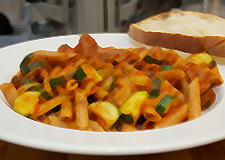
Here’s a summery pasta that will help use up some of the plentiful zucchini and tomatoes from your garden. With zucchini, the smaller and firmer they are, the more you will be able to appreciate their nutty flavor.
Ingredients:
- 3-4 cloves garlic, minced
- 2 tbsp olive oil
- 3/4 lb. bulk mild Italian sausage (chicken or turkey Italian sausage is fine) Note: If you can’t get bulk sausage, remove it from the casing. This is for fresh, uncooked and uncured sausage.
- 4 or more small, firm, zucchini, sliced in half lengthwise and cut into half coins
- 1/2 cup dry white wine
- 6-8 Roma tomatoes, peeled and mashed, with their juice, or 1 cup pureed tomatoes, preferably from your garden or the farmers’ market
- Small handful of fresh basil leaves, chopped
- 12 oz (uncooked) penne or fusilli pasta (or more)
- Freshly grated parmesan cheese for serving
- Salt
Method:
- Fill your large pasta pot 2/3 full with cold water and add a generous tablespoon of salt. Bring to a boil.
- While waiting for the water to boil, prepare the sauce. Sauté the garlic in the olive until the garlic turns golden.
- Add the sausage and sauté until the meat has mostly browned.
- Add the chopped zucchini and a pinch of salt. Sauté for a couple minutes, until the zucchini starts to go limp and throw off liquid.
- Add the white wine, stir well, and let the wine boil and reduce for 2-3 minutes.
- Add the tomatoes, bring to a boil, reduce for about 2 minutes and simmer until the pasta is done cooking
- By this time, the pasta water should be boiling, so add the pasta and cook until it’s al dente.
- When the pasta is almost done, turn off the heat under the sauce, and stir the chopped basil into the sauce. (If the sauce is too thin for you, reduce it a bit by boiling away some of the liquid before adding the basil. If it’s too thick, just add water.)
- Drain the pasta, and in a serving bowl or mixing bowl, mix the pasta and the sauce.
- Serve with lots of Parmesan cheese.
Serves 4 as a main course or 6 as a first course in a traditional Italian meal
Parma Ham Rolls

Kim Barnes says, "While spending time with my friend, Maria Ana Neves (whom I met at ATD a few years ago) at the ecotourism resort she manages in central Portugal, we enjoyed this dish greatly. The recipe is quick, simple, and absolutely delicious."
Ingredients:
- 8 slices Parma ham (prosciutto) (see note)
- 8-10 tbsp mascarpone cheese
- 6-8 oz arugula leaves (or to taste)
Method:
- Spread slices of Parma ham with the mascarpone cheese (about 2 tbsp each slice, or to taste)
- Cover with arugula leaves
- Roll up
Serves 4 as an appetizer.
Note: Pre-sliced prosciutto will not work for this recipe, it’s just too thin. Have the butcher slice it for you, just under about 1/16" so it will have some heft to hold the filling.
You are receiving these emails from Barnes & Conti because you are a client, colleague, and/or friend of Barnes & Conti Associates. or you contacted us through our website, at a trade show, or via social media. Barnes & Conti does not sell, trade, or give away mailing lists or email addresses to anyone. Period.
If you no longer wish to receive these bulletins, use this link to unsubscribe or write us at Barnes & Conti, 940 Dwight Way Suite 15, Berkeley, CA 94710.
*Please don't forward this entire email; the person you forward to might inadvertently unsubscribe you with the above link!